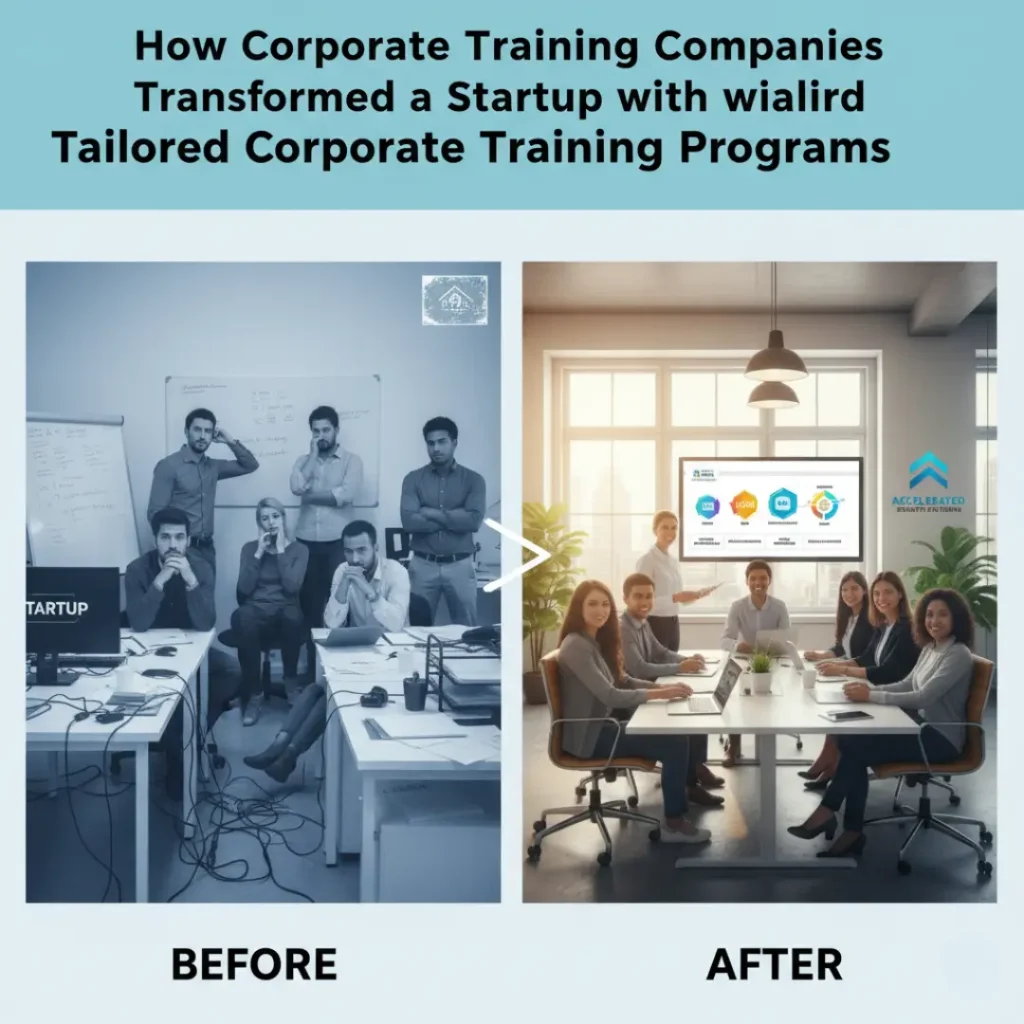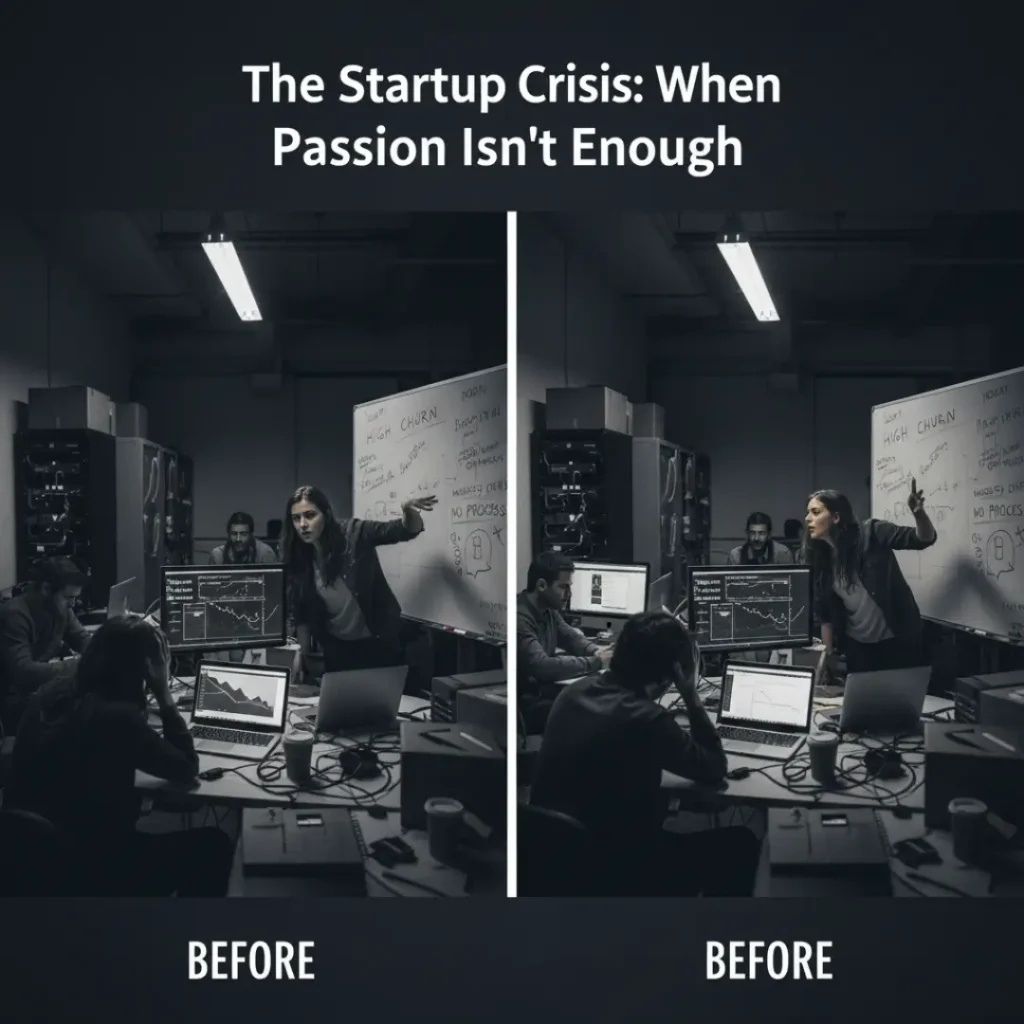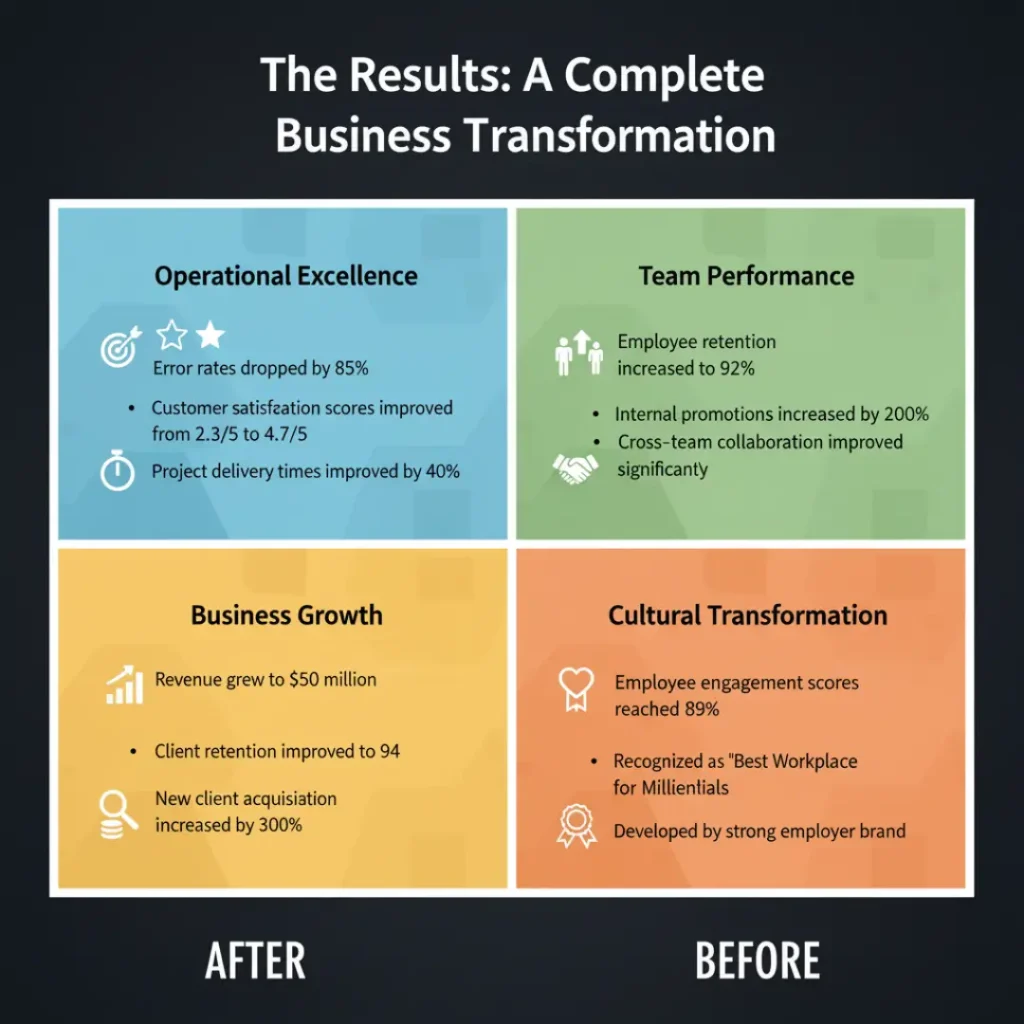
What happened next changed everything. Through strategic partnership with corporate training companies, TechNova not only survived but thrived, growing from 15 stressed employees to a 200-person powerhouse generating $50 million in annual revenue. This transformation didn’t happen overnight, and it certainly wasn’t magic – it was the result of carefully planned, targeted corporate training programs.
You are a startup founder with an amazing product idea, passionate team members, but you’re watching your dreams slowly crumble. Your employees are making costly mistakes, customer complaints are piling up, and team morale is at an all-time low. Sound familiar? This was exactly the situation faced by TechNova Solutions, a promising fintech startup that was struggling to survive despite having breakthrough technology.
Let’s dive into this incredible journey and discover how corporate training companies can be the secret weapon your startup needs to succeed.
The Startup Crisis: When Passion Isn’t Enough

TechNova Solutions started like many startups do with brilliant founders, innovative technology, and sky-high ambitions. Founded in 2019 by three MIT graduates, the company developed an AI-powered financial planning platform that promised to revolutionize how small businesses manage their finances.
However, by early 2021, the startup was facing severe challenges that threatened its very existence:
The Leadership Gap: The founders were exceptional engineers but struggled with managing people. They had no formal management training and found themselves making critical leadership mistakes that were affecting team productivity.
Skills Shortage: Most employees were fresh graduates with limited professional experience. While they were technically competent, they lacked essential soft skills like client communication, project management, and professional etiquette.
Quality Control Issues: Without proper training protocols, the team was delivering inconsistent work quality. Customer complaints increased by 300% within six months, and client retention dropped to just 40%.
Employee Turnover: Within 18 months, TechNova lost 60% of its original team. The lack of proper onboarding and development programs left employees feeling unsupported and undervalued.
Operational Chaos: The company had no standardized processes. Everyone worked differently, leading to confusion, missed deadlines, and frustrated clients.
Sarah Chen, TechNova’s co-founder and CEO, recalls the darkest moment: “We were three weeks away from running out of cash. Our biggest client was threatening to terminate their contract due to service quality issues. I remember thinking, ‘We have amazing technology, but we’re failing as a business because we don’t know how to run one.'”
The Turning Point: Recognizing the Need for Professional Training
The wake-up call came when TechNova lost a $2 million deal due to a presentation disaster. The sales team, lacking proper training in client communication and presentation skills, failed to convey the value of their innovative platform. The client later said, “Your product seems great, but your team doesn’t inspire confidence.”
This incident forced the leadership to confront a harsh reality: technical excellence alone wasn’t enough to build a successful business. They needed to invest in their people – not just their technical skills, but their professional capabilities as well.
After extensive research and consultations, TechNova decided to partner with three specialized corporate training companies to address their multifaceted challenges:
- LeadershipFirst – For management and leadership development
- SkillBridge Training – For technical and soft skills enhancement
- ProcessMax Solutions – For operational efficiency and quality management
The Transformation Strategy: A Multi-Phase Approach
Phase 1: Foundation Building (Months 1-3)
The training companies began with a comprehensive assessment to identify specific skill gaps and training needs. This wasn’t a one-size-fits-all approach – each program was tailored to TechNova’s unique challenges and industry requirements.
Leadership Development Program: The founders and team leaders underwent intensive leadership training. The program covered:
- Effective communication and feedback delivery
- Conflict resolution and team management
- Strategic planning and decision-making
- Building company culture and values
Basic Professional Skills Training: All employees participated in foundational training covering:
- Professional email communication
- Time management and productivity
- Meeting management and collaboration
- Customer service excellence
Process Standardization: The training team worked with TechNova to establish standardized workflows and quality control measures.
Phase 2: Skill Enhancement (Months 4-6)
With the foundation in place, the training companies focused on building specific competencies:
Technical Training: Advanced workshops were conducted to keep the team updated with latest industry practices and technologies. This included training on new programming frameworks, cybersecurity best practices, and fintech compliance requirements.
Sales and Presentation Skills: The sales team received comprehensive training in consultative selling, presentation design, and client relationship management. This directly addressed the issues that led to lost deals.
Customer Success Training: Customer-facing employees learned advanced customer service techniques, complaint resolution, and client retention strategies.
Phase 3: Advanced Development (Months 7-12)
The final phase focused on preparing the team for scale and long-term growth:
Advanced Leadership Programs: High-potential employees were identified and groomed for leadership roles through mentorship programs and advanced management training.
Cross-Functional Training: Employees were trained in multiple areas to increase versatility and collaboration between teams.
Innovation and Continuous Improvement: The team learned methodologies for continuous process improvement and innovation management.
The Results: A Complete Business Transformation

The impact of comprehensive corporate training was nothing short of remarkable. Here’s what TechNova achieved:
Operational Excellence
- Error rates dropped by 85% within the first six months
- Customer satisfaction scores improved from 2.3/5 to 4.7/5
- Project delivery times improved by 40% due to better process management
Team Performance
- Employee retention increased to 92%, making TechNova one of the most stable workplaces in their sector
- Internal promotions increased by 200% as employees developed leadership capabilities
- Cross-team collaboration improved significantly, with 95% of employees reporting better working relationships
Business Growth
- Revenue grew from $2.8 million to $50 million over three years
- Client retention improved to 94%, significantly boosting recurring revenue
- New client acquisition increased by 300% due to improved sales capabilities
- The company successfully raised Series B funding of $25 million, with investors specifically praising the team’s professional capabilities
Cultural Transformation
- Employee engagement scores reached 89%, up from just 31%
- TechNova was recognized as a ‘Best Workplace for Millennials’ by a leading business magazine
- The company developed a strong employer brand, attracting top talent from major tech companies
Key Success Factors: What Made the Difference
1. Comprehensive Needs Assessment
The training companies didn’t jump into generic programs. They spent considerable time understanding TechNova’s specific challenges, industry requirements, and growth aspirations. This assessment-first approach made sure every training hour was valuable and relevant.
2. Leadership Commitment
The founders didn’t just send their employees for training – they actively participated and led by example. Sarah Chen attended every leadership session and regularly shared her learning with the team, creating a culture that valued continuous improvement.
3. Practical, Application-Based Learning
Instead of theoretical lectures, the training programs focused on real-world application. Employees worked on actual TechNova challenges during training sessions, making the learning immediately relevant and actionable.
4. Ongoing Support and Reinforcement
The training companies provided six months of post-training support, including coaching sessions, progress reviews, and refresher workshops. This ensured that new skills were properly embedded and sustained.
5. Measurement and Feedback
Regular assessments and feedback mechanisms helped track progress and adjust training approaches as needed. This data-driven approach maximized the return on training investment.
The Ripple Effect: Beyond TechNova
The transformation at TechNova created positive ripple effects throughout their ecosystem:
Client Success: TechNova’s improved capabilities led to better outcomes for their clients, with small business customers reporting average cost savings of 23% and improved financial management.
Industry Recognition: The company became a case study for successful startup transformation, speaking at industry conferences and inspiring other startups to invest in training.
Community Impact: TechNova’s growth created 150+ new jobs in their local community, contributing to economic development.
Innovation Acceleration: With operational excellence achieved, the team could focus more on innovation, resulting in three new product launches and five patents filed.
Lessons for Other Startups: Your Roadmap to Success
Start Early, Don’t Wait for Crisis
While TechNova’s crisis led to transformation, proactive startups can avoid such situations by investing in training from day one. Early investment in people development creates a strong foundation for sustainable growth.
Invest Proportionally to Growth
Research shows that high-growth companies typically invest 3-5% of their revenue in employee development. This isn’t an expense – it’s an investment with measurable returns.
Address the Whole Person
Technical skills alone won’t build a successful business. Invest in soft skills, leadership development, and professional capabilities alongside technical training.
Choose the Right Training Partners
Not all training companies are created equal. Look for partners who:
- Understand your industry and startup challenges
- Offer customized programs, not just generic courses
- Provide ongoing support and measurement
- Have proven track records with similar companies
Make Training a Cultural Value
Training shouldn’t be a one-time event but an ongoing cultural commitment. Companies that create learning cultures consistently outperform their competitors.
Common Pitfalls to Avoid
Based on TechNova’s experience and industry research, here are common mistakes startups make with training:
The “We’re Too Small” Excuse
Many startups believe they’re too small for formal training. However, small companies actually benefit more from training investments because every employee has a bigger impact on overall performance.
The “We Can’t Afford It” Mentality
While budget constraints are real, the cost of not training is often higher. Poor performance, customer churn, and employee turnover can cost significantly more than training investments.
Generic One-Size-Fits-All Programs
Sending employees to random seminars rarely produces results. Invest in customized programs that address your specific challenges and industry requirements.
Lack of Leadership Participation
When leaders don’t participate in training, it sends a message that learning isn’t important. Leadership engagement is crucial for training success.
No Follow-Up or Reinforcement
Training without follow-up is like planting seeds without water. Build in coaching, mentoring, and reinforcement mechanisms to sustain learning.
The Future of Startup Training: Emerging Trends
As we look ahead, several trends are shaping how startups approach training:
AI-Powered Personalization
Advanced AI systems are creating personalized learning paths for each employee, making training more effective and efficient.
Microlearning and Just-in-Time Training
Short, focused learning modules delivered when needed are becoming more popular, especially for busy startup environments.
Virtual and Augmented Reality
Immersive training experiences are making complex skills training more effective, particularly for technical and customer service skills.
Continuous Learning Platforms
Modern platforms provide ongoing learning opportunities rather than one-time events, supporting the continuous improvement culture that successful startups need.
You Must Know
How to Choose the Best Corporate Training Services 2025 for Effective Training of Corporate Teams
How to Design Corporate Training Programs That Actually Build Professional Skills 2025
Your Next Steps: Making It Happen
If you’re a startup founder inspired by TechNova’s story, here’s how you can begin your own transformation:
- Conduct a Honest Skills Assessment: Identify where your team’s capabilities match your business needs and where gaps exist.
- Research Training Partners: Look for corporate training companies with startup experience and proven results in your industry.
- Start with Leadership: Begin with leadership training for founders and managers – this creates the foundation for all other improvements.
- Create a Training Budget: Allocate 3-5% of revenue for employee development and treat it as a non-negotiable investment.
- Communicate the Vision: Help your team understand why training matters and how it benefits everyone.
- Measure and Adjust: Track the impact of training and adjust programs based on results and feedback.
Conclusion: Your Transformation Awaits
TechNova’s journey from struggling startup to industry success story proves that corporate training companies can be the catalyst for incredible business transformation. The investment in people development didn’t just solve their immediate problems – it created a competitive advantage that continues to drive growth.
Remember, every successful company started with someone brave enough to invest in their people when they could have made excuses about budget or time. Your startup’s transformation story could be next.
The question isn’t whether you can afford to invest in corporate training it’s whether you can afford not to. Your team’s potential is waiting to be awakened, your customers are waiting for better service, and your business is waiting for the foundation that will support sustainable growth.
The time for transformation is now. Your future success depends on the investments you make in your people today.
